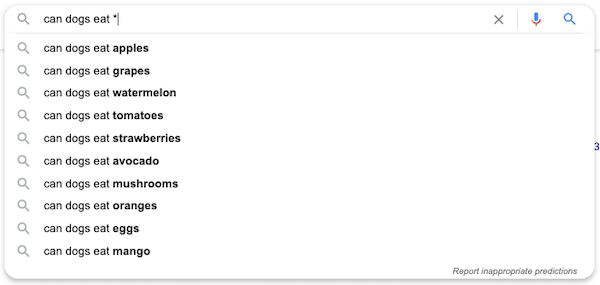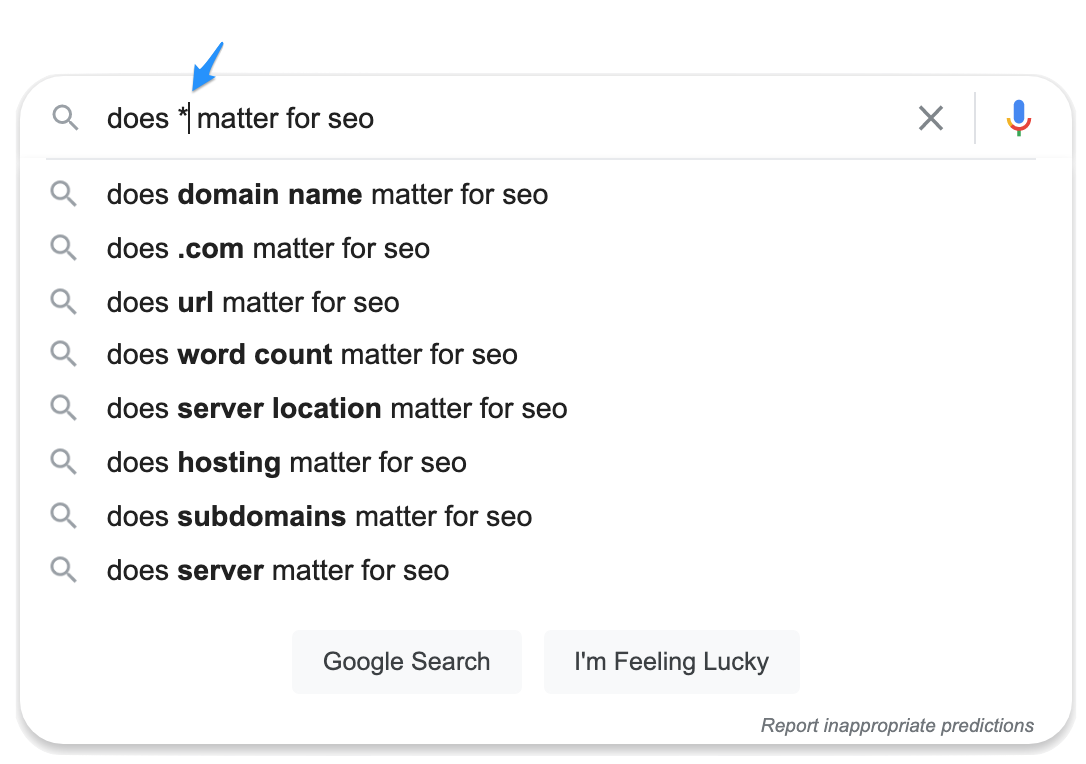Table of Contents
A high-performing SEO strategy requires thoughtful research and planning upfront. Quality in, quality out. But, spending too much time planning (inputs) takes away from time that could be spent doing (outputs).
We can balance the inputs and outputs by bringing scalable strategies to SEO. What do we mean by “scalable”? A strategy that allows us to significantly increase our output with a relatively small increase to our inputs.
Said another way, lots of doing for a small amount of planning.
Let’s explore a scalable SEO strategy that we call Wildcard Content.
What is Wildcard Content?
Wildcard Content is a strategy for content production that allows you to create a large volume of assets from a single templatized idea.
Let’s take a look at an example. A client of ours sells raw dog food products. The audience that we’re interested in reaching includes people who are concerned about what their dogs are eating.
Our keyword research surfaced the content idea “can dogs eat spinach”. We asked ourselves, does this idea scale?

 It sure does.
It sure does.
Instead of viewing “can dogs eat spinach” as a single content idea, we treated it like a Wildcard Keyword (i.e. “can dogs eat _____”).
The word “spinach” became a wildcard for anything that a dog might eat.
Why do we call it Wildcard Content?
We surface many of our ideas for Wildcard Content from Google’s autocomplete feature which allows you to use an asterisk symbol (“*”), referred to as a wildcard, as a placeholder for one or more words. Try it out!
As a result, we uncovered dozens of more content ideas with almost no additional effort. We’ve published 6 articles so far using the “can dogs eat _____” Wildcard Keyword and the SEO results are building:
- We drove 6.5k organic clicks in October and growth is accelerating
- We’re ranking for 2,000+ keywords that contain “can dogs eat”
Check out our full case study on Raw Bistro.
The biggest advantage of this strategy is that we’re able to focus the majority of our resources on production. There’s minimal time spent generating more content ideas, doing keyword research, analyzing competitors, and producing new outlines.
But these aren’t the only benefits.
What are the advantages of Wildcard Content?
Here are the main reasons why we seek out Wildcard Content:
- Generate many content opportunities from a single Wildcard Keyword
- Easily populate your content calendar for weeks or months
- Reuse and recycle one outline instead of having to create unique outlines for each piece of content
- Accelerate SEO results by spending more time doing and less time planning
Examples of Wildcard Content
We're going to look at three types of content that lend themselves to Wildcard Content opportunities:
Comparison Content
If there are several well-known competitors or brands in your industry (maybe you’re one of them), look for evidence that people are searching for comparisons.
Wildcard Keywords to watch for:
| Type | Wildcard Keyword |
|---|---|
| Competitor comparisons | "[Competitor A] vs [Competitor B]" |
| Competitor alternatives | "[Competitor A] alternatives" |
| Product comparisons | "[Product A] vs [Product B]" |
| Product alternatives | "[Product A] alternatives" |
| Method comparisons | "[Method A] vs [Method B]" |
| Method alternatives | "[Method A] alternatives" |
Example: Stitch Data’s competitive comparison pages
Sample URL: https://www.stitchdata.com/vs/striim/xplenty/
Scale:
- Stitch Data has nearly 300 indexed competitive comparison pages using the same page template
Results (Ahrefs):
- 2.4k organic keywords
- 1.2k organic traffic
- $6.7k organic traffic value
- 60 referring domains
Comparison content doesn’t have to be limited to comparing your company or brand against others. Here are some other ways to think of comparison content:
- Compare products your audience is using (e.g., “salesforce vs zoho”)
- Compare different product or service options (e.g., “cloud crm vs on premise”)
- Compare methods or schools of thought (e.g., “inbound sales vs outbound sales”)
For example, let’s say you’re an ecommerce company that sells dog collars and leashes. You find that there aren’t widely known brands being compared in search engines.
However, there are plenty of opportunities for comparison content that are relevant to your audience where you can position yourself as an authority.
- Compare categories of dog collar products:
- Compare popular dog training methods:
- Identify searches where “alternatives” are being sought:
Round-up Listicles
Just about any company has the opportunity to create curated lists. If not featuring your own products or services, these lists can highlight complementary or related products or services that your audience uses.
Wildcard Keywords to watch for:
| Type | Wildcard Keyword |
|---|---|
| Adjective-based investigative searches | "[best / cheapest / fastest] widgets" |
| Audience-based investigative searches | "best widgets for [marketers / moms / small dogs]" |
| Objective-based investigative searches | "best widgets for [weight loss / photo editing / gaming]" |
| Price-based investigative searches | "best widgets under [$25 / $100 / $1,000]" |
| Any combination of the Wildcard Keywords above! | "[best] widgets for [marketers] under [$100]" |
Example: Sportrx’s round-up listicles
Sample URL: https://www.sportrx.com/blog/best-polarized-fishing-sunglasses/
Scale:
- Sportrx has published 215 articles (detected by Ahrefs) that rank the best glasses for various activities or audiences
Results (Ahrefs):
- 11k organic keywords
- 26k organic traffic
- $31k organic traffic value
- 524 referring domains
If I had to guess, Sportrx identified a Wildcard Keyword and took advantage of Google’s autocomplete feature to populate their content calendar for weeks or even months.
Customer FAQs
Your customers are researching before they buy. They’re asking “who, what, when, where why and how” questions to gain confidence in their buying decision.
Depending on your product or service, these searches may be ripe with Wildcard Content opportunities.
Wildcard Keywords to watch for:
| Type | Wildcard Keyword |
|---|---|
| "Is/Are" Question | "is [your product or service] _____" |
| "Can" Question | "can [your product or service] _____" |
| "Does" Question | "does [your product or service] _____" |
| "How to" Question | "how to _____ [your product or service]" |
| "Why" Question | "why is [your product or service] _____" |
| "Where" Question | "where is [your product or service] _____" |
Example: Silencer Central’s location pages
Sample URL: https://www.silencercentral.com/locations/texas/
Scale:
- Silencer Central has published 42 landing pages that target the Wildcard Keyword “are silencers legal in [US state]”
Results (Ahrefs):
- 2.5k organic keywords
- 20k organic traffic
- $1.5k organic traffic value
- 27 referring domains
Silencer Central is a client of ours so we can take a deeper look at performance.
This Wildcard Content opportunity has earned us top rankings for their customers’ FAQs and led to massive gains in traffic and conversions.
How to Find Your Own Wildcard Content Opportunities
Look for Patterns to Find Wildcard Keywords
We’re on the hunt for Wildcard Keywords. By that, we mean that we’re looking for keywords that potentially offer us dozens of content opportunities simply by converting a word or phrase into a wildcard.
Wildcard Content opportunities are easy to overlook. Any individual keyword can look like a single content idea rather than a scalable keyword template.
So, we need to keep an eye out for patterns in our keyword research. These patterns might hint at potential Wildcard Keywords for us to identify.
Here are a few tips to identify patterns as you go about keyword research:
Tip #1: Look at competitors’ URLs using the Top Pages report in Ahrefs
See any patterns? In the example below, we noticed that several of the top-performing pages had URLs containing “under-[price]”.
After filtering the list, you can see that this website generates thousands of organic visits each month from a Wildcard Content strategy.
Pattern spotted! Many of this domain’s top-performing URLs contain “under” leading us to discover a Wildcard Content opportunity: “best [type of laptop] under [price]”
Tip #2: Export keywords in bulk and sort them alphabetically.
Sorting a big keyword list alphabetically can help you spot keywords that start with the same words or phrases.
Sorting a competitor’s keywords in the table above reveals a Wildcard Keyword: “at home _____ workout”.
Tip #3: Use Google’s Autocomplete feature and other tools
There’s no substitute for pulling up Google and taking advantage of its autocomplete feature to mine Wildcard Keywords.
Use the Wildcard Keywords we suggested in the previous section to jumpstart your search.
Here are a couple of helpful tools that can expedite your search:
The “People Also Ask” (PAA) boxes in search results can be good sources of customer service FAQs. AlsoAsked.com is a helpful tool that scrapes PAA boxes.
Conclusion
Wildcard Content can give your SEO strategy a huge boost in production without bogging down your time in research & planning. Go hunt for those Wildcard Keywords and let us know what you find!


